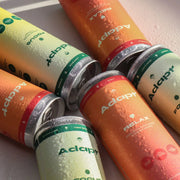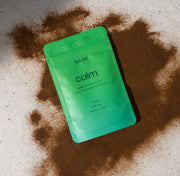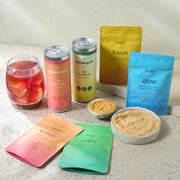Most people hit a wall around 2-3pm. Your brain slows down, you re-read the same paragraph multiple times, and coffee just makes you jittery without helping you think clearly.
Focus drinks are designed to solve this problem. They use nootropics and adaptogens to improve concentration and mental performance. But most brands hide behind vague claims about "boosting cognitive function" without telling you what's actually inside or whether the doses work.
What We Talk About When We Talk About Focus
Our brains are simultaneously the most powerful and most demanding organ we possess. It's about 2% of your body weight but burns through 20% of your total energy.
When I say "focus drinks," I'm not talking about Monster or Red Bull. Those are energy drinks - a completely different beast, and one that fundamentally misunderstands how the brain works.
Real focus drinks are something more subtle, more aligned with your neurobiology. They're designed to work with your brain's natural architecture.
The Orchestra Inside Your Head
Your brain operates through an impossibly complex symphony of chemicals called neurotransmitters. Dopamine for motivation and reward. Acetylcholine for memory and learning. Norepinephrine for alertness and attention.
When you can't focus, it's often because this chemical orchestra is out of tune. Maybe you're not producing enough of certain neurotransmitters. Maybe the pathways are inflamed. Maybe there's simply not enough blood flow delivering the raw materials your neurons need.
Nootropic drinks - the legitimate ones - address this by providing the supporting molecules that your brain needs to maintain this delicate balance.
The best focus formulations work through several pathways simultaneously. They improve cerebral blood flow, ensuring your neurons are getting enough oxygen and glucose.
The Ingredients That Actually Matter
Most products in this space are either underdosed, poorly formulated, or just riding the nootropic trend without understanding the underlying neuroscience. So let's talk about what actually works.
- Lion's Mane mushroom might be the most fascinating ingredient in the cognitive enhancement space right now. It appears to support the production of nerve growth factor - a protein that's essential for neuroplasticity, the brain's ability to form new connections and adapt.
- Adaptogens are where ancient plants meets modern neuroscience. Ashwagandha and Panax Ginseng - these plants have been used for centuries and now we're finally understanding why they work. They modulate your stress response system, helping you maintain cognitive performance under pressure.
- Caffeine itself deserves a more nuanced conversation than it usually gets. At 50-100mg caffeine is genuinely beneficial for cognitive function. It blocks adenosine receptors, temporarily preventing the "I'm tired" signal from fully registering. But more isn't better. Those 300mg energy drinks aren't giving you superhuman focus - they're just inducing a state of chemical panic that your brain interprets as urgency.
What Focus Drinks Are Not
Let me be clear about something, because honesty matters more than marketing: focus drinks are not limitless pills. They won't turn you into Bradley Cooper. They won't give you knowledge you don't have or skills you haven't developed.
What they can do - and this is significant - is help you access more of your existing capacity. Most of us are operating at 60-70% of our potential on any given day, limited by inflammation, poor sleep recovery or stress.
A well-formulated focus drink might help you operate at 85-90%. That's substantial. That's the difference between struggling through your afternoon and actually completing meaningful work.
You cannot supplement your way out of chronic sleep deprivation. You cannot drink your way past severe stress or nutritional deficiency. The brain is remarkably resilient, but it's not supernatural. If you're consistently sleeping five hours a night and living on processed food, no amount of nootropics will fully compensate.
The Energy Drink Trap
Here's why I get frustrated with the energy drink comparison. Energy drinks operate on a fundamentally flawed premise: that mental performance is just about feeling awake. So they dump 200-300mg of caffeine into a can, add a bunch of sugar or artificial sweeteners, maybe throw in some B-vitamins for good measure, and call it a day.
The result? Your nervous system goes into overdrive. Your heart rate increases. You feel jittery, anxious, artificially urgent. And yes, you're technically awake. But are you thinking clearly? Can you do deep work? Can you solve complex problems or think creatively?
Who This Actually Matters For
I developed Adapt because I needed it. I was drinking four coffees a day and feeling increasingly scattered. The energy drinks made me feel worse.
But the principles work for anyone whose livelihood depends on their brain performing consistently. Students preparing for exams. Developers debugging at 2am (though maybe sort out that sleep schedule first). Parents trying to work from home while managing, well, life.
Cutting Through the Noise
The functional beverage market is, to put it mildly, a bit of a mess. There are some genuinely good products out there, but they're drowning in a sea of mediocrity and outright nonsense.
Here's my framework for evaluation, developed after years of reading labels and rolling my eyes:
- Look for transparency. If a company won't tell you exactly how much of each ingredient is in their product - hiding behind "proprietary blends" - that's a red flag. You have a right to know what you're putting in your body and in what quantities.
- Check for effective dosages. Pixie-dusting is rampant in this industry - adding tiny amounts of popular ingredients just to list them on the label. Lion's Mane works at around 1000mg+. If there's 250mg in a drink, it's decoration, not medicine.
- Research-backed ingredients matter. I'm not saying every compound needs fifty clinical trials, but there should be some evidence base. Traditional use is valuable. Mechanistic understanding is valuable. "We think it sounds cool" is not valuable.
- Look out for flavour enhancer and artificial sweeteners. Substances like Erthyitol and Aspartame are not natural. They are linked with cardiac arrests, diabetes and gut health issues.
The Truth
I could tell you that focus drinks are going to transform your life, turn you into a productivity machine, unlock your hidden potential.
Here's what I'll actually tell you: if you're operating in the modern knowledge economy, your brain is probably working harder than it's evolutionarily designed to. We didn't evolve to stare at screens for eight hours, context-switch between seventeen different tasks, and maintain focus in open-plan offices.
Focus and nootropic drinks, when properly formulated with ingredients that actually work at doses that actually matter, can help bridge that gap.
For me, developing Adapt was about creating the product I wished had existed during those long research years. Something honest. Something that actually works. Something that respects both the complexity of neuroscience and the realities of people's lives.
And now, finally, we're starting to figure out how to provide that.
Stay focused,
Michael
Co-Founder & Neuroscientist, Adapt



